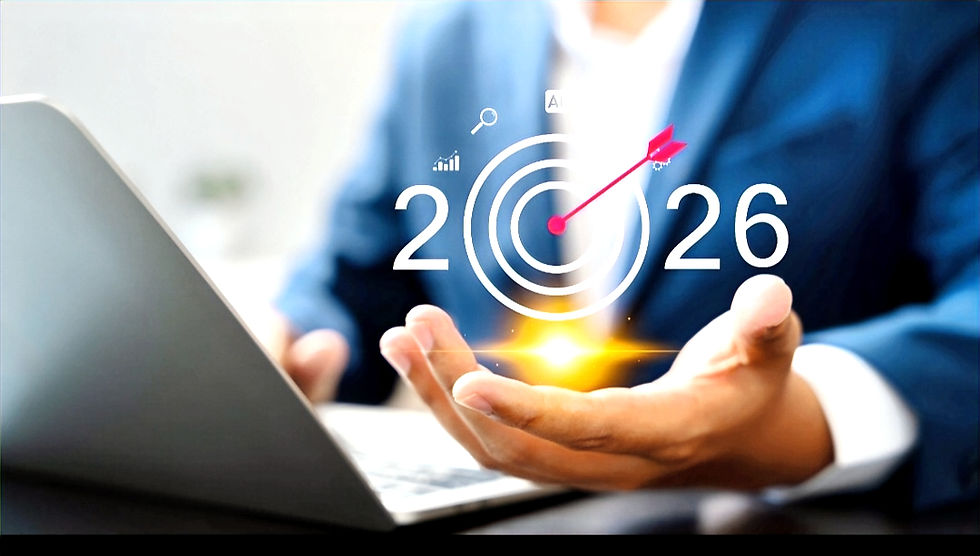Crafting an Effective Digital Marketing Strategy for Success in 2026
- MediaRock Communications Ltd

- Oct 20, 2025
- 3 min read

In the fast-paced world of digital marketing, staying ahead is essential for businesses aiming to thrive in 2026. As technology evolves and consumer behavior shifts, a strong digital marketing strategy is crucial. This post will guide you through the essential steps to create a digital marketing strategy that meets current demands and positions your brand for future success.
Understanding the Digital Landscape
The digital landscape is constantly changing, shaped by technology, consumer preferences, and emerging platforms. By 2026, businesses will need to adapt to trends like artificial intelligence, voice search, and immersive experiences.
To navigate this landscape effectively, conduct thorough market research. Analyze competitors and identify target audiences. For instance, a 2022 survey showed that 60% of marketing leaders believe that understanding consumer behavior is a top priority. Gather data through surveys or social media analytics to make informed decisions guiding your marketing strategy for success in 2026.
Setting Clear Objectives strategy for success in 2026
Once you understand the digital landscape, set clear and measurable objectives. Your goals should align with your overall business objectives and be specific, achievable, relevant, and time-bound (SMART).
For example, instead of saying "increase website traffic," aim for "increase website traffic by 30% within six months." This clarity helps focus your efforts. A study found that businesses with clearly defined goals are 1.5 times more likely to succeed in their marketing efforts.
Identifying Your Target Audience
Knowing your target audience is fundamental to successful marketing. In 2026, personalization will be vital. Use data analytics to segment your audience based on demographics, interests, and behaviors.
Create detailed buyer personas. For example, if you're targeting millennials interested in eco-friendly products, understand their values and preferred communication channels. This knowledge enables you to craft messaging and content that resonates, driving engagement and conversions.
Leveraging Emerging Technologies
Emerging technologies will greatly influence digital marketing strategies by 2026. Tools like artificial intelligence, augmented reality, and virtual reality can enhance customer experiences.
For instance, incorporating AI-driven tools can automate processes and personalize content. Chatbots can offer instant customer support, and AI algorithms can optimize ad targeting. According to recent studies, using AI can improve lead generation efficiency by up to 50%. Embracing these technologies will improve efficiency and enhance the customer experience.
Crafting Compelling Content
Content remains paramount in digital marketing. In 2026, producing high-quality, engaging content is essential for capturing your audience's attention. Focus on a variety of content types like blog posts, videos, podcasts, and infographics.
Utilize storytelling in your content strategy. Share authentic stories that connect with your audience. For example, a brand that shares customer success stories can build trust and loyalty. Incorporating user-generated content can enhance authenticity and foster community engagement, making customers feel part of your brand.
Optimizing for Search Engines
Search engine optimization (SEO) will remain a critical part of digital marketing strategies in 2026. As search engines evolve, adjust your SEO approach. Optimizing for voice search and featured snippets will become essential.
Conduct keyword research to find relevant terms your audience is searching for. Use tools like Google Keyword Planner to identify high-volume keywords. Incorporate these naturally into your content while ensuring it remains valuable. Regularly updating your content can boost your search engine rankings. Statistics show that businesses that maintain a blog have 97% more backlinks, greatly improving SEO.
Embracing Social Responsibility
In 2026, consumers will increasingly gravitate toward brands that demonstrate social responsibility. Incorporating sustainability and ethical practices into your marketing strategy can enhance your brand's reputation and appeal to socially conscious consumers.
Highlight your brand’s commitment to social causes or environmental sustainability in your marketing efforts. A Nielsen study revealed that 66% of global consumers are willing to pay more for sustainable brands. This approach not only differentiates you but also builds trust and loyalty among your audience.
Measuring and Analyzing Performance
To ensure your digital marketing strategy's effectiveness, regularly measure and analyze performance. Use analytics tools to track key performance indicators (KPIs) such as website traffic, conversion rates, and engagement metrics.
By analyzing this data, you can identify areas for improvement and make informed decisions. Regularly reviewing your strategy allows you to adapt to changing trends and consumer behaviors, ensuring your marketing efforts remain relevant and effective. Companies that use data to drive decisions are six times more likely to be profitable.
Final Thoughts
Crafting an effective digital marketing strategy for 2026 requires a proactive approach and adaptability to the ever-changing landscape. By understanding the digital environment, setting clear objectives, identifying your target audience, leveraging emerging technologies, creating compelling content, optimizing for search engines, embracing social responsibility, and measuring performance, you can position your brand for success.
As you begin this journey, remember that flexibility and innovation will be key. Stay informed about industry trends, refine your strategy continuously, and experiment with new ideas. With the right approach, your digital marketing strategy can meet the demands of 2026 and drive sustainable growth for your business.







Comments